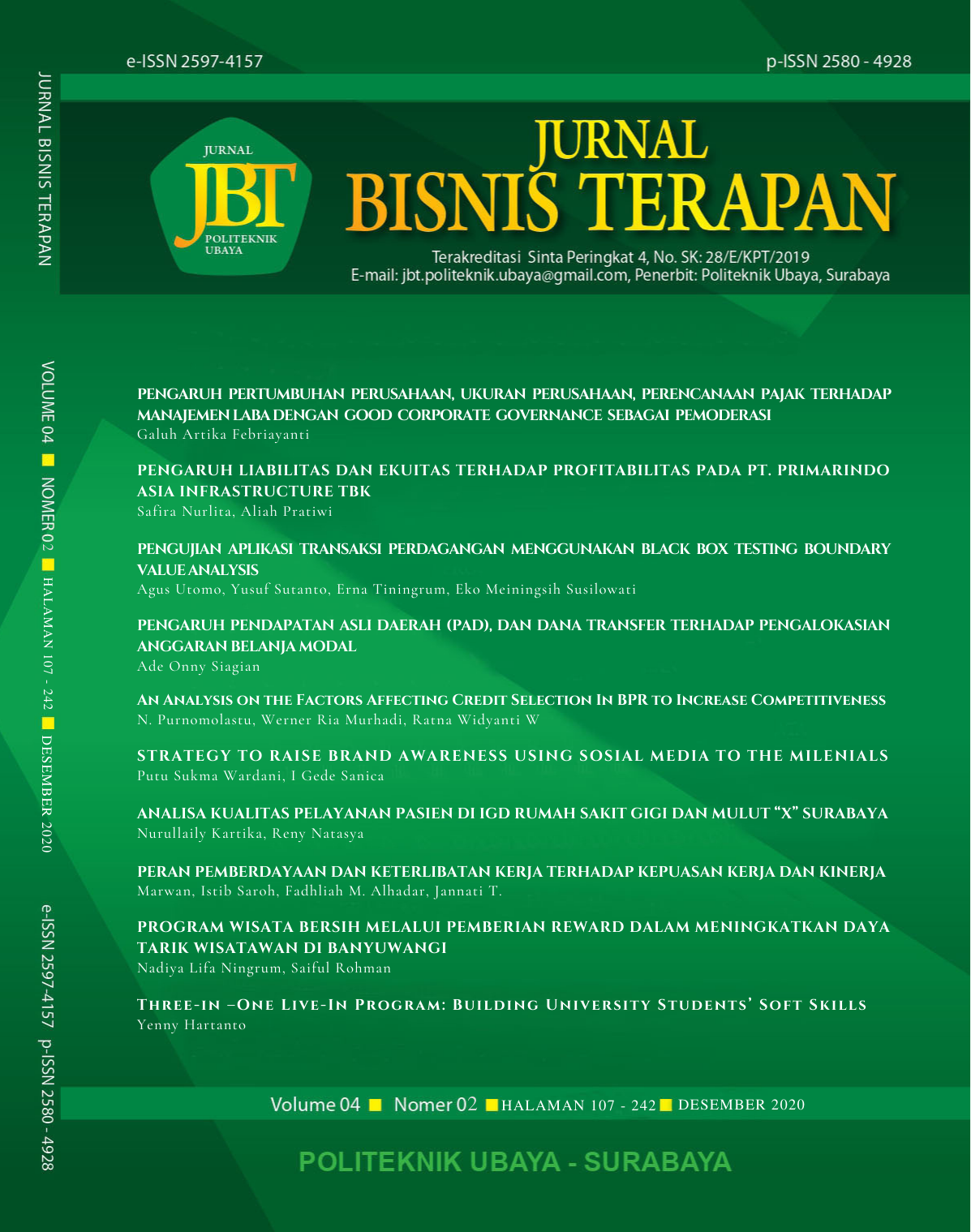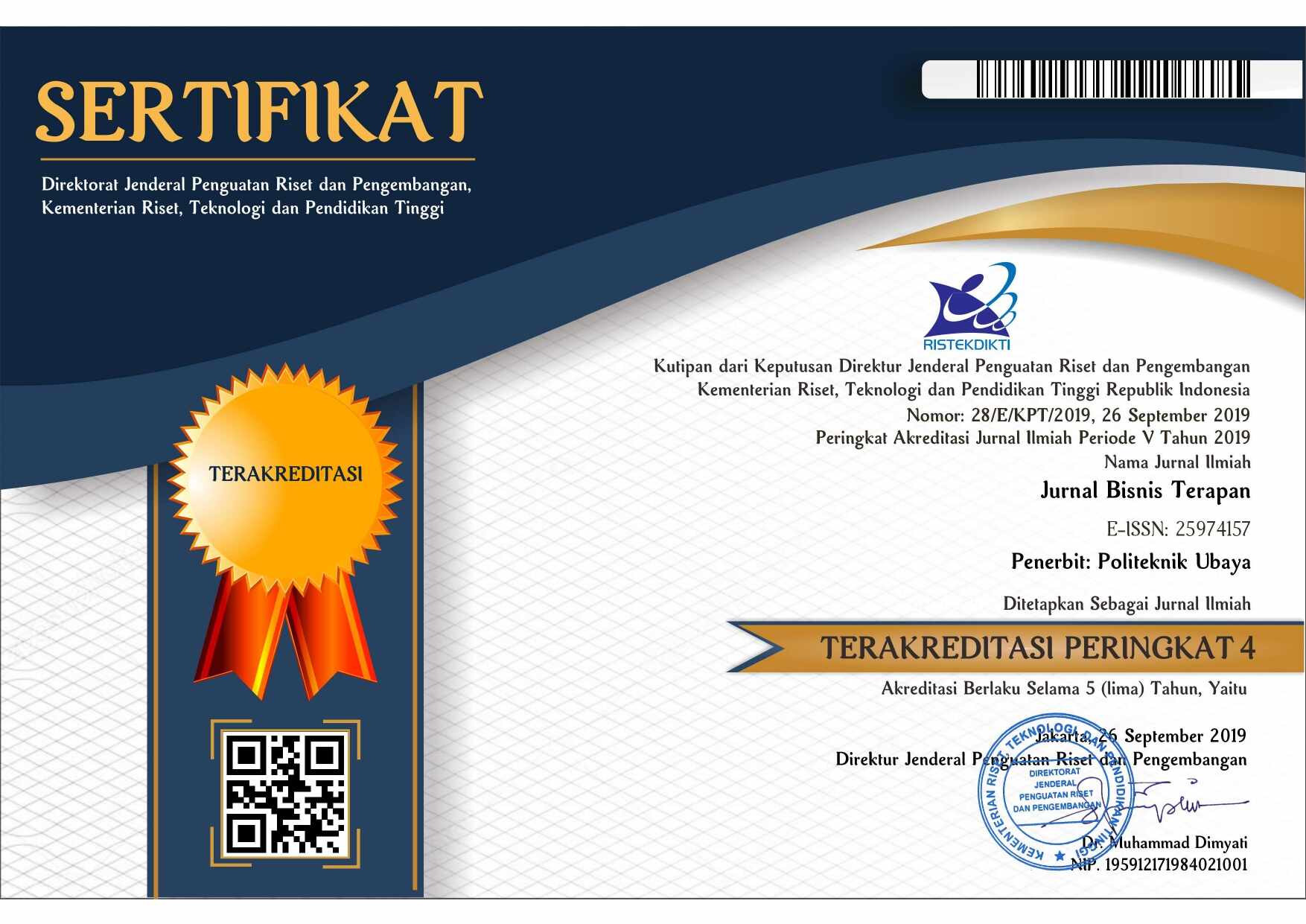PENGARUH PERTUMBUHAN PERUSAHAAN, UKURAN PERUSAHAAN, PERENCANAAN PAJAK TERHADAP MANAJEMEN LABA DENGAN GOOD CORPORATE GOVERNANCE SEBAGAI PEMODERASI
 Abstract Views:
1162 times
Abstract Views:
1162 times
 PDF Downloads:
1057 times
PDF Downloads:
1057 times
Abstract
The implementation of Good Corporate Governance (GCG) will encourage business people to carry out business practices that prioritize the going concern of the company, the interests of stakeholders, and avoid ways of gaining instant profits that are detrimental to others so as to create fair competition and a conducive business climate. Good Corporate Governance (GCG) implemented by companies in Indonesia is very important to support economic growth and stability. Research on earnings management has been carried out both overseas and domestically. But it was found that there was a research gap in previous studies. This research was conducted because of the gap research phenomenon from previous studies. The object of this research is manufacturing companies listed on the Indonesia Stock Exchange from 2015-2018 with a sample of 57 companies. The results showed that company growth and company size did not have a significant effect on earnings management. While tax planning has a significant influence on earnings management. This research shows that Good Corporate Governance does not moderate the relationship between company size and earnings management. Good Corporate Governance also does not moderate the relationship between tax planning and earnings management.
Downloads
References
Aditama, F dan Anna Purwaningsih. 2014. “Pengaruh Perencanaan Pajak Terhadap Manajemen Laba Pada Perusahaan Nonmanufaktur Yang Terdaftar Di Bursa Efek Indonesia”. Jurnal Modus Volume 26 Nomor 1 Edisi Maret. Universitas Atmajaya. Yogyakarta. p:33 – 50.
Aprina, Desi Nur dan Khairunnisa. 2015. “Pengaruh Ukuran Perusahaan, Profitabilitas, dan Kompensasi Bonus Terhadap Manajemen Laba”. e-Proceeding of Management Volume 2 Nomor 3 Edisi Desember. Universitas Telkom. Bandung. p: 3251 – 3258.
Bagozzi anda Yi. 1988. “On the Evaluation of Structure Equation Model”. Journal of the Academy of Marketing Science Volume 16 Nomor 1 Edisi Januari. p: 74-94.
Dwiarti, Rina dan Anna. 2019. “Pengaruh Profitabilitas, Resiko Keuangan dan Pertumbuhan Perusahaan terhadap Manajemen Laba pada Perusahaan Kosmetik dan Keperluan Rumah Tangga yang Terdaftar di Bursa Efek Indonesia Tahun 2013-2017”. Jurnal Manajemen dan Keuangan Volume 8 Nomor 1 Edisi Mei. Universitas Samudra. Aceh. p: 21 – 33.
Fricilia dan Hendro. 2015. “Analisis Faktor-Faktor yang Mempengaruhi Praktik Manajemen Laba pada Industri Perbankan di Indonesia”. Jurnal Akuntansi Volume 19 Nomor 1 Edisi Januari. Universitas Tarumanegara. p:79 – 92.
Ghozali, I., dan Latan, H. (2012). Partial Least Squares, Konsep, Teknik, dan Aplikasi SmartPLS 2.0 M3. Semarang: Badan Penerbit Universitas Diponegoro.
Gustina dan Lince Bulutoding. 2017. “Pengaruh Penerapan PSAK 55 (Revisi 2011) terhadap Manajemen Laba dengan Ukuran KAP sebagai Variabel Moderating. Jurnal Assets”. Volume 7 Nomor 2 Edisi Desember. Fakultas Ekonomi dan Bisnis Islam UIN Alauddin. Makassar. p: 197 – 211.
Hair, Joe et al. 2011. “An Assessment of the Use of Partial Least Squares Structural Euation Modelling in Marketing Research”. Academy of Marketing Science Volume 12 Nomor 1 Edisi Juli. p: 414-433.
Henseler, Jorg et al. 2009. The Use of Partial Least Squares Path Modelling in International Marketing. Advances in International Marketing. Emerald. p: 277-319.
Khotimah. 2014. “Pengaruh Perencanaan Pajak Terhadap Manajemen Laba”. Jurnal Bisnis dan Manajemen Volume 4 Nomor 2 Edisi Agustus. Universitas Islam Negeri Syarif Hidayatullah. Jakarta. p: 170 – 177.
Kusumawati. Eny. 2019. “Determinan Manajemen Laba: Kajian Empiris pada Perusahaan Manufaktur Go Publik di Bursa Efek Indonesia”. Jurnal Riset Akuntansi dan Keuangan Indonesia. Volume 4 Nomor 1 Edisi April. Universitas Muhammadiyah Surakarta. p: 25 - 42.
Lestari dan Sugeng. 2013. “Pengaruh Earnings Management Terhadap Nilai Perusahaan Dimoderasi Dengan Praktik Good Corporate Governance (Studi Empiris Pada Perusahaan Non Keuangan yang Terdaftar di Bursa Efek Indonesia” Tahun 2008 – 2011). Diponegoro Journal of Accounting Volume 2 Nomor 3 Edisi Juli. Universitas Diponegoro. p: 494 – 502.
Makaombohe, Yuliati Yosephani, Sifrid S., dan Victorina. 2014. “Ukuran Perusahaan Terhadap Manajemen Laba Pada Perbankan yang Terdaftar di Bursa Efek Indonesia Periode 2008-2011”. Jurnal EMBA Volume 2, Nomor 1 Edisi Maret. Universitas Sam Ratulangi. Manado. p: 656 – 665.
Pertiwi, Tri Kartika dan Ferry. 2011. “Pengaruh Kinerja Keuangan, Good Corporate Governance terhadap Nilai Perusahaan Food And Beverage”. Jurnal Manajemen dan Kewirausahaan Volume 14 Nomor 2 Edisi September. Universitas Kristen Petra. Surabaya. p: 118-127.
Scott, W. R. 2011. Financial Accounting Theory, 6 edition. United States: Pearson.
Siagian, Sondang P. 2011. Manajemen Sumberdaya Manusia. Jakarta. Bumi Aksara.
Suandy, Erly. 2014. Perencanaan Pajak. Salemba Empat: Jakarta
Swingly, Calvin dan I. M. Sukartha. 2015. “Pengaruh Karakter Eksekutif, Komite Audit, Ukuran Perusahaan, Leverage dan Sales Growth pada Tax Avoidance”. E-Jurnal Akuntansi. Volume 10 Nomor 1 Edisi Januari. Universitas Udayana. p: 47 – 62.
Wibisana, Imas Danar dan Ratnaningsih. 2014. “Analisis Faktor-Faktor yang Mempengaruhi Arah Manajemen Laba (Studi Pada Perusahaan Manufaktur yang Terdaftar di BEI 2009-2013)”. Jurnal Ekonomi Akuntansi. Universitas Atma Jaya. Yogyakarta. p: 1 – 13.
Yudiastuti dan I Wayan. 2018. “Good Corporate Governance Memoderasi Pengaruh Leverage Terhadap Manajemen Laba”. e-journal Akuntansi Volume 23 Nomor 1 Edisi April. Universitas Udayana. Bali. p: 130 – 155.


This work is licensed under a Creative Commons Attribution-NonCommercial-ShareAlike 4.0 International License.

Ciptaan disebarluaskan di bawah Lisensi Creative Commons Atribusi-NonKomersial-BerbagiSerupa 4.0 Internasional.
-
Articles published in Jurnal Bisnis Terapan are licensed under a Creative Commons Attribution-NonCommercial-ShareAlike 4.0 International (CC BY-NC-SA 4.0) license, which permits anyone to copy, transform, or redistribute articles for any lawful purpose in any medium, provided appropriate credit is given to the original author(s) and Jurnal Bisnis Terapan is recognized as its original publisher. A link to this license should also be provided. Any derivative work of an article published in Jurnal Bisnis Terapan must also be shared under the same (or compatible) license.
-
Both copyright and publishing rights on articles are retained by the respective author(s), without restrictions. Only a non-exclusive license is granted to Jurnal Bisnis Terapan to publish the article and identify itself as its original publisher.

 DOI:
DOI:






